- Home
- Umberto Eco
The Mysterious Flame Of Queen Loana Page 2
The Mysterious Flame Of Queen Loana Read online
Page 2
"Tokyo. Atom bomb on Hiroshima. General MacArthur…"
"Whoa, whoa. It’s as though you remember all the things you read in a book somewhere, or were told, but not the things associated with your direct experience. You know that Napoleon was defeated at Waterloo, but try to tell me the name of your mother."
"You only have one mother, your mother is still your mother… But as for my mine, I don’t remember her. I suppose I had a mother, since I know it’s a law of the species, but… here again… the fog. I’m sick, doctor. It’s horrible. I want something to help me go back to sleep."
"I’ll give you something in a moment, I’ve already asked too much of you. Just lie back now, good… To repeat, these things happen, but people get better. With a great deal of patience. I’ll have them bring you something to drink, perhaps some tea. Do you like tea?"
"Maybe I do and maybe I don’t."
They brought me tea. The nurse had me sit up against my pillows and placed a tray in front of me. She poured some steaming water into a cup with a little bag in it. Go slow, she said, it burns.
What do you mean, slow? I sniffed the cup and detected the odor, I wanted to say, of smoke. I wanted to see what tea was like, so I took the cup and swallowed. Dreadful. A fire, a flame, a slap in the mouth. So this is boiling tea. It is probably the same with coffee, or chamomile, which everyone talks about. Now I know what it means to burn yourself. Everybody knows you are not supposed to touch fire, but I did not know at what point you could touch hot water. I must learn to recognize the threshold, the moment when before you couldn’t and after you can. I blew mechanically on the liquid, then stirred it some more with the spoon, until I decided I could try again. Now the tea was warm and it was good to drink. I was not sure which taste was the tea and which the sugar; one must have been bitter and the other sweet, but which was the sweet and which the bitter? In any case, I liked the combination. I will always drink my tea with sugar. But not boiling. The tea made me feel peaceful and relaxed, and I went to sleep.
I woke again. Perhaps because in my sleep I was scratching my groin and scrotum. I was sweating under the covers. Bedsores? My groin is damp, and when I rub my hands over it too energetically, after an initial sensation of violent pleasure, the friction feels very unpleasant. It’s nicer with the scrotum. You take it between your fingers-gently I might add, without going so far as to squeeze the testicles-and you feel something granular and slightly hairy: it’s nice to scratch your scrotum. The itching does not go away immediately, in fact it gets worse, but then it feels even better to continue. Pleasure is the cessation of pain, but itching is not pain, it is an invitation to give yourself pleasure. The titillation of the flesh. By indulging in it you commit a sin. The provident young man sleeps on his back with his hands clasped on his chest so as not to commit impure acts in his sleep. A strange business, itching. And my balls… You’re a ballbuster. That guy’s got balls.
I opened my eyes. A woman was standing there. She was not all that young, over fifty I would guess, with fine lines around her eyes. But her face was luminous, still youthful. A few little streaks of white hair, barely noticeable, as though she had had them lightened on purpose, coquettishly, as if to say, I’m not trying to pass for a girl, but I wear my years well. She was lovely, but when she was young she must have been stunning. She was caressing my forehead.
"Yambo," she said.
"Iambo who, Signora?"
"You’re Yambo. That’s what everyone calls you. And I’m Paola, your wife. Recognize me?"
"No, Signora-I mean, no, Paola. I’m very sorry, the doctor must have explained."
"He explained. You no longer know what’s happened to you, but you still know perfectly well what’s happened to others. Since I’m part of your personal history, you no longer know that we’ve been married, my dear Yambo, for more than thirty years. And we have two daughters, Carla and Nicoletta, and three wonderful grandchildren. Carla married young and had two children, Alessandro who’s five and Luca who’s three. Nicoletta’s son, Giangiacomo, Giangio for short, is also three. Twin cousins, you used to say. And you were… you are… you will still be a wonderful grandfather. You were a good father, too."
"And… am I a good husband?"
Paola rolled her eyes skyward: "We’re still here, aren’t we? Let’s say that over the course of thirty years there have been ups and downs. You were always considered a good-looking man…"
"This morning, yesterday, ten years ago, I saw a horrible face in the mirror."
"After what’s happened to you, that’s the least you’d expect. But you were, you still are, a good-looking man, you have an irresistible smile, and some women didn’t resist. Nor did you-you always said you could resist anything but temptation."
"I ask your forgiveness."
"Well, that’s a bit like the guys dropping smart bombs on Baghdad and then apologizing when a few civilians die."
"Bombs on Baghdad? There aren’t any in A Thousand and One Nights."
"There was a war, the Gulf War. It’s over now. Or maybe not. Iraq invaded Kuwait, the Western nations intervened. You don’t recall any of it?"
"The doctor said that episodic memory-the kind that seems to have gone tilt-is tied to the emotions. Maybe the bombing of Baghdad was something I felt strongly about."
"I’ll say. You’ve always been a devout pacifist, and you agonized over this war. Almost two hundred years ago Maine de Biran identified three types of memory: ideas, feelings, and habits. You remember ideas and habits but not feelings, which are of course the most personal."
"How is it you know all this good stuff?"
"I’m a psychologist, that’s my job. But wait a second: you just said that your episodic memory had gone tilt. Why did you use that phrase?"
"It’s an expression."
"Yes, but it’s a thing that happens in pinball and you are… you were fanatical about pinball, like a little kid."
"I know what pinball is. But I don’t know who I am, you see? There’s fog in Val Padana. By the way, where are we?"
"In Val Padana. We live in Milan. In the winter months you can see the fog in the park from our house. You live in Milan and you’re an antiquarian book dealer. You have a studio full of old books."
"The curse of the pharaoh. If I was a Bodoni and they baptized me Giambattista, things couldn’t have turned out any other way."
"They turned out well. You’re considered very good at what you do, and we’re not billionaires but we live well. I’ll help you, and you’ll recover a little at a time. God, if I think about it, you might have not woken up at all. These doctors have been excellent, they got to you in time. My love, can I welcome you back? You act as if you’re meeting me for the first time. Fine, if I were to meet you now, for the first time, I’d marry you just the same. Okay?"
"You’re very sweet. I need you. You’re the only one who can tell me about the last thirty years."
"Thirty-five. We met in college, in Turin. You were about to graduate and I was the lost freshman, roaming the halls of Palazzo Campana. I asked you where a certain classroom was, and you hooked me immediately, you seduced a defenseless high-school girl. Then one thing and another-I was too young, you went off to spend three years abroad. Afterward, we got together-as a trial, we said, but I ended up getting pregnant, and you married me because you were a gentleman. No, sorry, also because we loved each other, we really did, and because you liked the idea of becoming a father. Don’t worry, Papà, I’ll help you remember everything, you’ll see."
"Unless this is all a conspiracy, and my name is really Jimmy Picklock and I’m a burglar, and everything you and Gratarolo are telling me is a pack of lies, maybe, for instance, you’re secret agents, and you need to supply me with a false identity in order to send me out to spy on the other side of the Berlin Wall, The Ipcress File, and…"
"The Berlin Wall isn’t there anymore. They tore it down, and the Soviet empire is falling to pieces…"
"Christ, you turn your ba
ck for a second and look what they get up to. Okay, I’m kidding, I trust you. What are stracchini?"
"Huh? Stracchino is a kind of soft cheese, but that’s what it’s called in Piedmont, here in Milan it’s called crescenza. What makes you bring up stracchini?"
"It was when I was squeezing the toothpaste tube. Hang on. There was a painter named Broglio, who couldn’t make a living off of his paintings, but he didn’t want to work because he said he had a nervous condition. It seemed to be an excuse to get his sister to support him. Eventually his friends found him a job with a company that made or sold cheeses. He was walking past a big pile of stracchini, each one wrapped in a packet of semitransparent wax paper, and because of his condition, or so he said, he couldn’t resist the temptation: he took them one by one and whack, he smashed them, making the cheese shoot out of the package. He destroyed a hundred or so stracchini before he was fired. All because of his condition. Apparently smacking stracchini, or as he said, sgnaché i strachèn, was a turn-on. My God, Paola, this must be a childhood memory! Didn’t I lose all memory of my past experiences?"
Paola started laughing: "I’m sorry, I remember now. You’re right, it is something you heard about as a kid. But you told that story often-it became part of your repertoire, so to speak. You were always making your dinner companions laugh with the story of the painter and his stracchini, and they in turn told others. You’re not remembering your own experience, unfortunately-it’s just a story you’ve told on numerous occasions and that for you has, how shall I say?, entered the public domain, like the story of Little Red Riding Hood."
"You’re already proving indispensable to me. I’m happy to have you as my wife. I thank you for existing, Paola."
"Good Lord, just a month ago you would have called that expression soap-opera schmaltz…"
"You’ll have to forgive me. I can’t seem to say anything that comes from the heart. I don’t have feelings, I only have memorable sayings."
"Poor dear."
"That sounds like a stock phrase, too."
"Bastard."
This Paola really loves me.
I had a peaceful night-who knows what Gratarolo put in my veins. I woke gradually, and my eyes must still have been closed, because I heard Paola whispering, so as not to wake me: "But couldn’t it be psychogenic amnesia?"
"We can’t rule that out," Gratarolo replied. "There may always be unfathomable tensions at the root of these incidents. But you saw his file, the lesions are real."
I opened my eyes and said good morning. Two young women and three children were also present. I had never seen them before, but I guessed who they were. It was terrible, because a wife is one thing, but daughters, my God, they are blood of your blood, and grandchildren too. The eyes of those two young women were shining with happiness, and the kids wanted to get up on the bed. They took me by the hand and said Hi, Grandpa. And nothing. It was not even fog, it was more like apathy. Or is it ataraxia? Like watching animals at the zoo-they could have been little monkeys or giraffes. Of course I smiled and said kind words, but inside I was empty. I suddenly thought of the word sgurato, but I did not know what it meant. I asked Paola. It is a Piedmontese word that means when you wash a pot thoroughly and then scrub it out with that metal wool stuff, so that it looks new again, as shiny and clean as can be. That was it, I felt thoroughly sgurato. Gratarolo, Paola, and the girls were cramming a thousand details of my life into my head, but they were like dry beans: when you moved the pot, they slid around in there but stayed raw, not soaking up any broth or cream-nothing to titillate the taste buds, nothing you would care to taste again. I was listening to things that happened to me as though they had happened to someone else.
I stroked the children and could smell their odor, without being able to define it except to say that it was tender. All that came to mind was there are perfumes as fresh as a child’s flesh. And indeed my head was not empty, it was a maelstrom of memories that were not mine: the marchioness went out at five o’clock in the middle of the journey of our life, Abraham begat Isaac and Isaac begat Jacob and Jacob begat the man of La Mancha, and that was when I saw the pendulum betwixt a smile and tear, on the branch of Lake Como where late the sweet birds sang, the snows of yesteryear softly falling into the dark mutinous Shannon waves, messieurs les Anglais je me suis couché de bonne heure, though words cannot heal the women come and go, here we shall make Italy or a kiss is just a kiss, tu quoque alea, a man without qualities fights and runs away, brothers of Italy ask not what you can do for your country, the plow that makes the furrow will live to fight another day, I mean a Nose by any other name, Italy is made now the rest is commentary, mi espíritu se purifica en Paris con aguacero, don’t ask us for the word crazed with light, we’ll have our battle in the shade and suddenly it’s evening, around my heart three ladies’ arms I sing, oh Valentino Valentino wherefore art thou, happy families are all alike said the bridegroom to the bride, Guido I wish that mother died today, I recognized the trembling of man’s first disobedience, de la musique où marchent des colombes, go little book to where the lemons blossom, once upon a time there lived Achilles son of Peleus, and the earth was without form and too much with us, Licht mehr licht über alles, Contessa, what oh what is life? and Jill came tumbling after. Names, names, names: Angelo Dall’Oca Bianca, Lord Brummell, Pindar, Flaubert, Disraeli, Remigio Zena, Jurassic, Fattori, Straparola and the pleasant nights, de Pompadour, Smith and Wesson, Rosa Luxemburg, Zeno Cosini, Palma the Elder, Archaeopteryx, Ciceruacchio, Matthew Mark Luke John, Pinocchio, Justine, Maria Goretti, Thaïs the whore with the shitty fingernails, Osteoporosis, Saint Honoré, Bactria Ecbatana Persepolis Susa Arbela, Alexander and the Gordian knot.
The encyclopedia was tumbling down on me, its pages loose, and I felt like waving my hands the way one does amid a swarm of bees. Meanwhile the children were calling me Grandpa, I knew I was supposed to love them more than myself, and yet I could not tell which was Giangio, which was Alessandro, which was Luca. I knew all about Alexander the Great, but nothing about Alessandro the tiny, the mine.
I said I was feeling weak and wanted to sleep. They left, and I cried. Tears are salty. So, I still had feelings. Yes, but made fresh daily. Whatever feelings I once had were no longer mine. I wondered whether I had ever been religious; it was clear, whatever the answer, that I had lost my soul.
The next morning, with Paola there, Gratarolo had me sit at a table where he showed me a series of little colored squares, lots of them. He would hand me one and ask me what color it was. A-tisket, a-tasket, a green and yellow basket… Was it red? Was it brown? Was it blue? No! Just a little yellow basket. The first five or six I recognized without any trouble: red, yellow, green, and so on. Naturally I said that A noir, E blanc, I rouge, U vert, O bleu, voyelles, je dirais quelque jour vos naissances latentes. But I realized that the poet or whoever was lying. What does it mean to say A is black? Rather it was as if I were discovering colors for the first time: red was quite cheerful, fire red, but perhaps too strong. No, maybe yellow was stronger, like a light suddenly switched on and pointed at my eyes. Green made me feel peaceful. The difficulties arose with the other little squares. What’s this? Green, I said. But Gratarolo pressed me: what type of green, how is it different from this one? Shrug. Paola explained that one was emerald green and the other was pea green. Emeralds are gems, I said, and peas are vegetables that you eat. They are round and they come in a long, lumpy pod. But I had never seen either emeralds or peas. Don’t worry, Gratarola said, in English they have more than three thousand terms for different colors, yet most people can name eight at best. The average person can recognize the colors of the rainbow: red, orange, yellow, green, blue, indigo, and violet-though people already begin to have trouble with indigo and violet. It takes a lot of experience to learn to distinguish and name the various shades, and a painter is better at it than, say, a taxi driver, who just has to know the colors of traffic lights.
Gratarolo gave me a pen and paper. Write, he said. "What the
hell am I supposed to write?" was what I wrote, and it felt as if I had never done anything but write. The pen was sleek and glided smoothly over the paper. "Write whatever comes to mind," Gratarolo said.
Mind? I wrote: love that within my mind discourses with me, the love that moves the sun and the other stars, stars hide your fires, if I were fire I would burn the world, I’ve got the world on a string, there are strings in the human heart, the heart does not take orders, who would hear me among the angels’ orders, fools rush in where angels fear to tread, tread lightly she is near, lie lightly on her, a beautiful lie, touched with the wonder of mortal beauty, wonder is the poet’s aim.

 Baudolino
Baudolino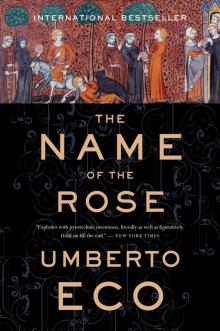 The Name of the Rose
The Name of the Rose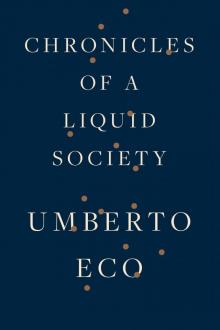 Chronicles of a Liquid Society
Chronicles of a Liquid Society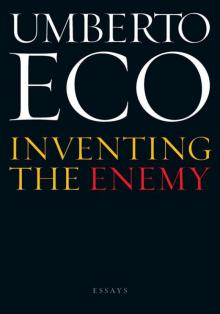 Inventing the Enemy: Essays
Inventing the Enemy: Essays Foucault's Pendulum
Foucault's Pendulum How to Travel With a Salmon & Other Essays
How to Travel With a Salmon & Other Essays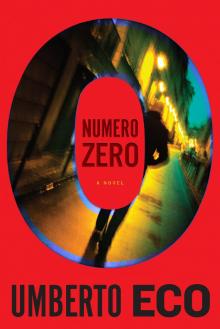 Numero zero
Numero zero The Island of the Day Before
The Island of the Day Before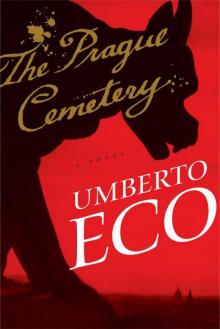 UMBERTO ECO : THE PRAGUE CEMETERY
UMBERTO ECO : THE PRAGUE CEMETERY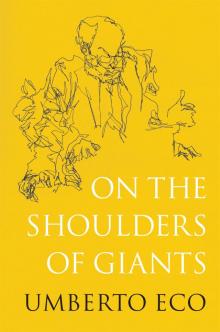 On the Shoulders of Giants
On the Shoulders of Giants Misreadings
Misreadings Six Walks in the Fictional Woods
Six Walks in the Fictional Woods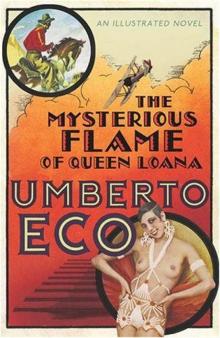 The Mysterious Flame Of Queen Loana
The Mysterious Flame Of Queen Loana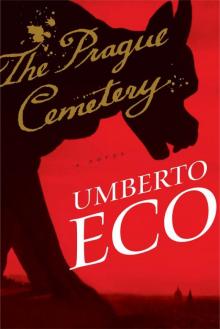 The Prague Cemetery
The Prague Cemetery On Literature
On Literature Lost structure
Lost structure